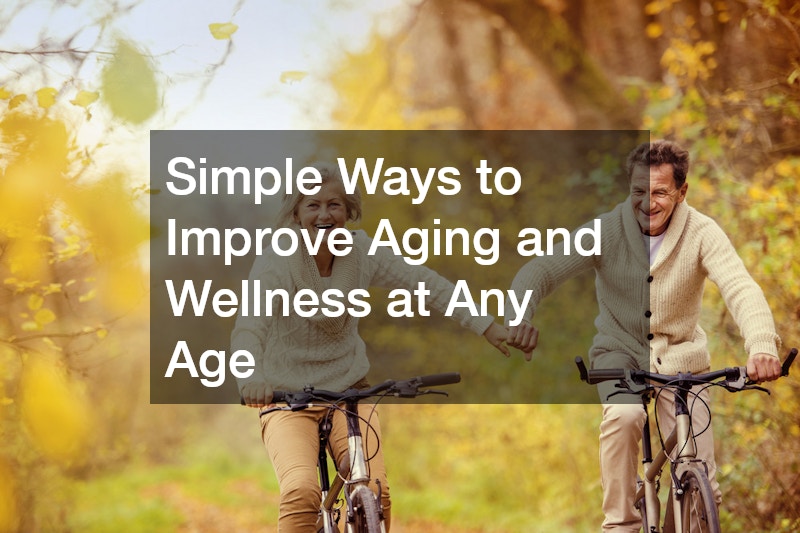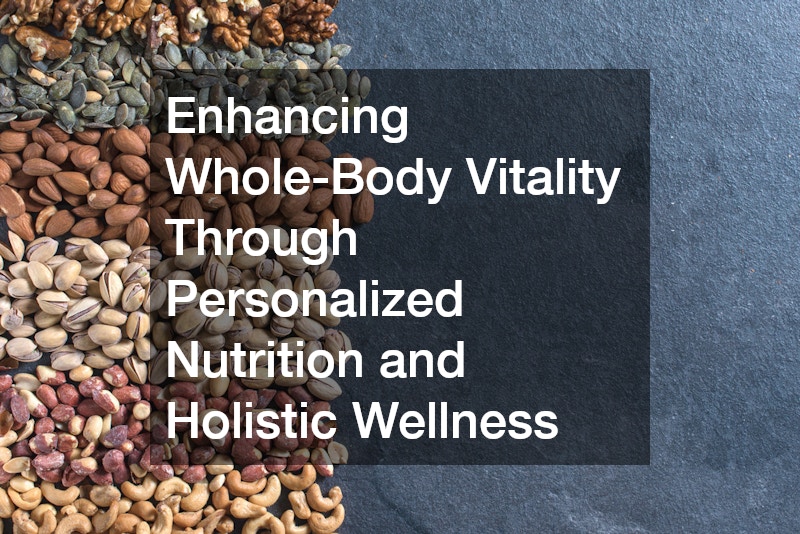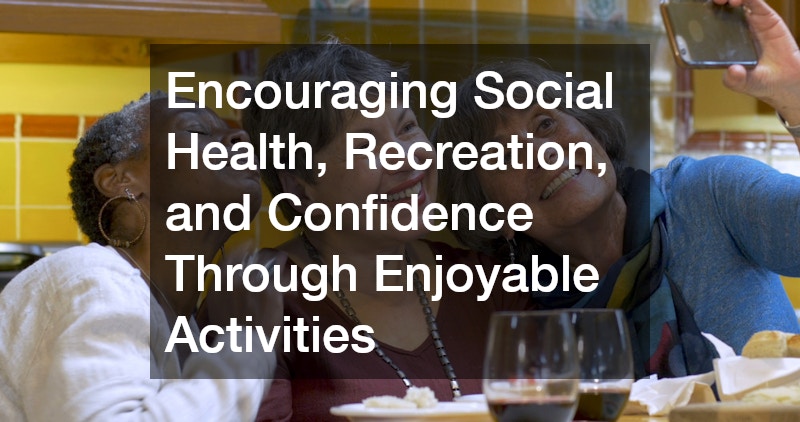
Aging is a natural part of life, and with the right habits, routines, and lifestyle adjustments, it’s possible to maintain strength, vitality, and a sense of purpose at every stage. More people today are looking for accessible, practical strategies that allow them to feel their best regardless of how old they are. Small daily actions can make a significant difference in long-term health, energy, mood, and resilience. By focusing on simple, foundational practices—such as movement, mindful eating, stress reduction, restorative sleep, and social engagement—anyone can build a healthier path forward.
A growing number of communities, professionals, and wellness resources make it easier than ever to develop routines that support whole-body living. Whether someone is entering midlife, navigating retirement, or embracing later years, the essentials that support longevity remain consistent: good nutrition, quality movement, emotional balance, proactive health monitoring, and strong social connections. The key is choosing approachable, sustainable methods that promote overall wellness without feeling overwhelming or unrealistic.
Supporting Skin, Mobility, and Everyday Comfort Through Practical Lifestyle Care
Healthy skin and comfortable mobility become increasingly important as people get older, and simple routines can make a noticeable difference in long-term comfort. Taking care of the skin often goes hand in hand with taking care of the entire body, because the skin reflects underlying hydration, nutrition, and general health. Protective habits such as using moisturizers, wearing sunscreen, maintaining adequate hydration, and choosing gentle cleansers can all support smoother, more resilient skin. The body’s natural processes slow down over time, so small investments in prevention contribute to more confidence and comfort each day. Focusing on the relationship between the skin, circulation, and immune system helps individuals better understand how to support themselves as daily needs evolve.
Adding basic movement into a daily routine is one of the simplest ways to boost circulation, support joint function, and enhance mood. Whether someone prefers walking, stretching, gentle strength exercises, or low-impact activities, movement promotes stability and reduces stiffness. Creating routines that feel enjoyable ensures consistency, making it easier to age with confidence. A strong connection also exists between mobility and the ability to maintain independence, so regular movement becomes both a wellness practice and a lifestyle choice. Activities that support flexibility—such as yoga, tai chi, or slow stretching—can be done anywhere and suit a wide variety of fitness levels.
Everyone benefits from understanding when professional support may be needed. Many individuals find that combining home routines with services that offer specialized care leads to more effective results. For example, people dealing with slow-healing injuries or delicate skin concerns may seek out wound care services to receive proper treatment, education, and long-term support. This combination of home habits and expert guidance helps individuals stay proactive about their well-being. As lifestyle routines and professional insights come together, people often discover a renewed sense of confidence and purpose. As part of this process, many individuals also begin exploring the broader connection between these habits and aging and wellness, finding that small, consistent efforts contribute to greater comfort over time.
Strengthening Cardiovascular Health and Circulation With Daily Habits
Optimizing heart and circulatory health plays a critical role in helping individuals maintain strength, stamina, and confidence. Cardiovascular well-being affects energy levels, balance, muscle function, and even cognitive sharpness. Fortunately, many simple habits—such as walking regularly, staying hydrated, and choosing heart-supportive foods—can enhance circulation, reduce inflammation, and support long-term vitality. These approachable changes help people of all ages feel more empowered and in control of their health. The circulatory system touches nearly every major process in the body, so improvements often deliver wide-reaching benefits.
Building heart-healthy meals does not require complicated meal planning. Most people see improvements by focusing on colorful fruits and vegetables, lean proteins, nuts, seeds, and whole grains. These foods provide nutrients that reduce strain on the heart while supporting metabolism and immune function. Over time, these consistent choices can contribute to better endurance and stronger everyday movement. Pairing healthy meals with mindful hydration bolsters circulation further, helping nutrients move efficiently throughout the body. A balanced diet, steady hydration, and moderate daily activity create a foundation for improved comfort and resilience.
Some individuals choose to supplement their wellness habits with guidance from specialists focused on circulation and heart health. Services offered at vascular clinics allow people to receive evaluations, professional insights, and prevention strategies that address concerns early. Whether someone is dealing with genetic risk factors or simply prioritizing future well-being, specialty care provides clarity and direction. Integrating expert support with home habits often leads to better outcomes and more confident long-term planning. For many people, this journey becomes a meaningful part of strengthening their approach to aging and wellness, helping them stay engaged and active in the years ahead.
Building Confidence Through Personalized Oral and Facial Health Support
A healthy smile plays a significant role in daily comfort, self-esteem, and overall well-being. Oral health influences far more than appearance—it affects chewing, digestion, speech, and the ability to enjoy social interactions comfortably. Establishing simple daily habits such as brushing twice a day, flossing, and staying hydrated helps maintain gum and tooth health, preventing discomfort and complications. A vibrant smile can significantly boost confidence, making it easier to stay socially engaged, which is an important component of long-term wellness.
Technology continues to expand the options people have for improving their oral health. Many adults today explore discreet ways to maintain or enhance dental alignment without drawing attention to the process. For example, teeth aligners offer a streamlined method for correcting uneven spacing or bite issues, allowing individuals to support their oral structure comfortably. Improvements in alignment can also enhance chewing efficiency and reduce strain on the jaw. When individuals feel good about their smile, they often feel more motivated to maintain other aspects of health as well.
Supporting physical and emotional confidence becomes easier when oral care and facial health are approached proactively. Regular dental checkups, consistent home habits, and professional services work together to create a sense of empowerment around long-term wellness. Oral health is closely linked with the cardiovascular system, the immune system, and the digestive system, so prioritizing dental care offers benefits that extend far beyond the mouth. This comprehensive approach reinforces the broader connection between daily choices and aging and wellness, helping individuals feel more balanced and supported in every stage of life. In fact, focusing on these accessible habits contributes to the overall sense of well-being that encourages people to continue investing in routines that benefit their future.
Encouraging Movement and Reducing Discomfort Through Joint-Friendly Practices
Movement is a cornerstone of lifelong health, yet many people find that maintaining mobility becomes more challenging over time. Stiffness, joint discomfort, and reduced range of motion can make everyday tasks feel more difficult. However, gentle movement practices often provide significant relief. Activities like walking, chair exercises, and low-impact stretching routines help nourish the joints by improving blood flow and reducing tension. This approach supports both comfort and functional strength, making it easier for individuals to maintain independence.
Supporting the body through joint-friendly exercises helps build balance, stability, and confidence. These activities also contribute to improved posture, core strength, and coordination. Small routines—completed even just a few minutes a day—encourage the body to stay adaptable and strong. Reduced discomfort allows individuals to continue participating in the hobbies and physical activities they enjoy most. Over time, simple movement habits can significantly improve quality of life and promote a more sustainable, comfortable daily experience.
Some people may require additional guidance as they manage concerns related to circulation or limb discomfort. In certain cases, professionals may recommend specialized approaches or targeted interventions. One example is peripheral artery disease treatment, which is designed to address circulatory challenges that may reduce comfort during walking or physical activity. Receiving proper evaluation and guidance helps individuals stay active while ensuring they receive the support they need for safe, effective movement. These professional insights help people understand how to adapt their routines to enhance comfort and function. For many individuals, improving mobility becomes an essential step in reinforcing their long-term approach to aging and wellness, empowering them to continue pursuing the routines and activities they value throughout life.
Improving Strength, Stability, and Everyday Independence With Supportive Exercise
Strength and balance influence nearly every aspect of daily living. Maintaining muscle tone becomes essential for protecting joints, supporting posture, and preventing falls—especially as people get older. Fortunately, strength-building exercises do not require heavy weights or complicated routines. Simple movements such as wall push-ups, chair stands, or resistance band exercises help maintain muscle mass while supporting functional independence. These routines can be done at home and adapted to suit any fitness level, making them accessible and sustainable over time.
Balance-focused exercises also play a key role in preserving confidence. Movements such as single-leg stands, heel-to-toe walking, or slow, controlled transitions from sitting to standing help maintain coordination and stability. Practicing these routines regularly reduces the risk of falls and supports more fluid movement throughout the day. Individuals often find that improved balance enhances their ability to enjoy hobbies, community events, and outdoor activities without hesitation.
Professional guidance can further strengthen a fitness routine, especially for those recovering from injuries or dealing with long-standing mobility concerns. Working with a local physical therapist provides personalized instruction that addresses specific movement patterns, muscular imbalances, or functional challenges. Tailored plans help individuals safely regain strength, flexibility, and coordination while preventing future injuries. This personalized approach often inspires greater confidence and motivates individuals to stay consistent with their routines. Supporting mobility through exercise becomes an essential part of long-term well-being, helping people maintain a positive connection between physical movement and aging and wellness as they continue shaping habits that support their long-term goals.
Enhancing Whole-Body Vitality Through Personalized Nutrition and Holistic Wellness
Nutrition is one of the most effective ways to support long-term health, energy, and emotional balance. Eating nutrient-rich foods helps stabilize blood sugar, support immune function, and promote healthy digestion. Focusing on whole foods—such as vegetables, legumes, lean proteins, and healthy fats—provides the body with the building blocks it needs to function efficiently. Individuals often experience improvements in energy levels, mood, and mental clarity simply by making small, consistent improvements to daily eating patterns. This approachable style of nutrition ensures that meals remain enjoyable, flexible, and sustainable.
Beyond traditional nutrition, many people explore additional strategies to optimize wellness in a holistic way. Practices like mindful eating, stress management techniques, or sleep-supportive routines contribute to an overall sense of balance and well-being. Establishing a calming evening routine, limiting screen use before bed, or practicing relaxation exercises can dramatically improve sleep quality, which plays a direct role in long-term health. The cumulative effect of these habits helps reduce inflammation, support cognitive function, and enhance the body’s natural healing processes.
Some individuals seek personalized guidance that goes beyond general nutrition advice. Professional resources such as a functional medicine service provide deeper insights into hormonal balance, nutrient deficiencies, digestion, and metabolic function. These comprehensive evaluations help individuals understand how their body responds to different factors, allowing them to make choices that support their unique needs. Combining holistic guidance with practical daily habits empowers people to take control of their well-being.
Supporting Hydration, Energy, and Immunity Through Proactive Self-Care Practices
Adequate hydration supports nearly every major function in the body, including digestion, circulation, cognitive performance, and temperature regulation. As people age, the body’s natural thirst cues may become less noticeable, making intentional hydration increasingly important. Simple practices like carrying a water bottle, drinking a glass of water before meals, or choosing hydrating foods help ensure that the body functions efficiently. Proper hydration also supports skin elasticity, joint lubrication, and metabolic balance, forming a key part of sustainable, everyday wellness.
Many individuals also explore supplemental strategies for hydration and nutrient support. This is especially helpful for people who have difficulty absorbing nutrients efficiently or those who experience fatigue, stress, or frequent illness. Options such as iv hydration therapy provide targeted support to help replenish fluids, electrolytes, and essential nutrients quickly. This method may be used to support energy levels, promote recovery, or boost immune resilience. Although not necessary for everyone, it offers an additional resource for individuals who want to support their overall vitality through personalized care.
Hydration is just one component of comprehensive self-care. Nourishing the mind through relaxation routines, maintaining meaningful relationships, and engaging in hobbies all contribute to long-term emotional and physical well-being. Social engagement improves cognitive function and reduces feelings of isolation, making it a cornerstone of healthy long-term living. By staying mentally and emotionally connected, individuals often find it easier to maintain physical routines, nutritional habits, and mobility practices.
Encouraging Social Health, Recreation, and Confidence Through Enjoyable Activities
Recreation, social engagement, and enjoyable hobbies contribute significantly to emotional well-being, making them essential components of lifelong health. Participating in meaningful activities helps individuals maintain a sense of purpose, strengthen their social networks, and stay mentally stimulated. Community involvement—whether through group classes, volunteer work, or outdoor activities—provides structure and encourages people to remain active and engaged. Social habits also support cognitive resilience, reducing the risk of isolation-related challenges that many individuals face as they get older.
Recreational pursuits that combine movement and social interaction offer additional benefits. For example, some people explore new skills or interests that keep the body active while allowing for fun and connection. Activities like adult swim lessons help improve cardiovascular health, mobility, and core strength, while offering an enjoyable way to stay moving. Others may enjoy exploring creative or leisurely activities that support relaxation and emotional expression. A balanced blend of physical engagement and social interaction creates a foundation for sustainable, uplifting wellness habits.
Some individuals choose to elevate their everyday routines with support or enhancements that add convenience or enrichment to their lifestyle. This may include scheduling regular checkups with a cosmetic dentist to maintain a bright, healthy smile or choosing transportation options like a local luxury golf cart to make neighborhood outings easier and more enjoyable. These lifestyle enhancements contribute to comfort, mobility, and confidence.





